On Monday, Fenzel launched a discussion about how elements of Agile product development seem to be having an impact on strategy in the Civilization series. However, in the midst of that discussion, he was compelled to take a step back and ask an even more fundamental question:
Pete Fenzel: With the Cold War long gone, the pop age of Guns, Germs, and Steel over, and great cultural and scientific triumph no longer in fashion, is Civilization still relevant?
Certainly the series depends on a certain casual ethnocentrism that it has tried to tamp down in the latest iteration – the leaders speak in their native languages, there is an effort to represent a very wide range of skin tone, gender, and social role and to avoid very well-known conquerors (there’s Trajan instead of Julius Caesar or Augustus, there’s Pericles and Gorgo instead of Alexander the Great, there’s Catherine de Medici instead of Napoleon or Louis XIV, there’s no Bismark or Mao. They might be waiting for an expansion for a lot of the big names, or they might be pushing away from the great conqueror / great leader / great man / great empire paradigm that is so historically comfortable but at this point terribly regressive.
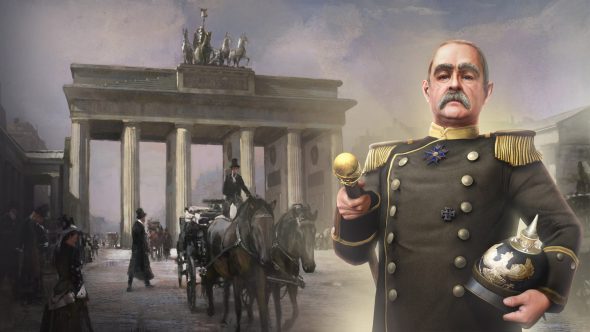
Also the victory conditions seem to be getting less clear and less triumphalist. Things you used to be able to do in Civ to win the game that you can’t anymore:
- Conquer the World (now you win by domination if you control everyone’s capital)
- Send a spaceship to Alpha Centauri (that’s been downgraded to Mars)
- Build the United Nations and be elected Chairman of the World through diplomacy (or whatever they called it)
- Create a Great Cultural Project (now cultural wins are through tourism)
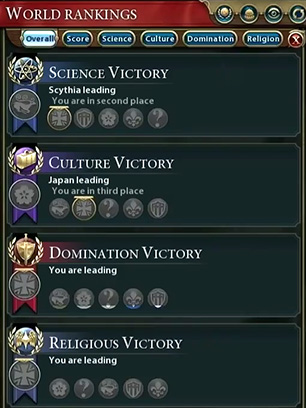
It feels like the Civs dream smaller than they used to. The ending animations feel cheap and minor, almost mocking you for your ambition, or humoring you, but pitying you, for winning through war.
A lot of this might come with the bonus of ending multiplayer games faster, which is good, but it brings some storytelling along with it.
Another weird thing about this game is founding a religion is much less powerful than it was in the last game, and also riskier and harder to do. It’s often the right strategy to just forego building any holy sites or shrines at all, with the unfortunate cost that if the computer opponent attempts to win through religious victory, your only option late in the game becomes to murder any missionaries that come near your territory with artillery shells (well, actually, you can murder them any way you want, you just have to murder them or you lose).
Parts of Civ VI do feel like they’re blaming you a bit for liking previous Civ games. Your advisor is a sanitized, sensitive soul who relays basic game information with empathy, as opposed to before, when video capture of random nerds in togas used to exhort you to make the streets run red with blood.

I don’t mind Civ becoming less of an open endorsement for global war, but isn’t that grand fantasy of supremacy baked into it already? And it’s certainly not very funny anymore, even as it has gotten more cartoonish and added a lot of jokes (read deadpan by Sean Bean).
And what does it take for Civ to reform itself? Is it enough for it to be “less bad,” or does that just make it “lesser?”
And it’s not right to lay all this at the feet of Civ VI – there has been a lot of change in the 15 years this game series has been around
Jordan Stokes: I’ll say this: It’s funny that they define being a massive tourism destination as “winning.” Rather than as “getting soft-colonized.”
Although if you care mainly about culture… when the Roman empire took over Greece, did the Greek civilization “beat them,” culturally speaking?
John Perich: I hate to be the one who can only communicate this in terms of Civ V, but in Civ V at least, there was a background calculation of the ratio of your “tourism” vs. their “tourism.” Once your tourism swamped theirs by a set ratio, you overtook them and achieved cultural dominance. Certain factors, like open borders or a shared religion, could accelerate that process.
This translates, to me, as “I prefer a foreign culture to my own,” which is as clear a metaphor for “cultural domination” as I could come up with.
But it is something of an alien experience for me, a lifelong American, since I’ve lived my life in a civ that’s perpetually about 10 turns away from a complete cultural victory. They keep the threat of a conquest victory around just in case but don’t seem committed to it.
Stokes: A fundamental issue with Civilization is that it’s mashing together a bunch of different games. (This is also a big part of its charm, of course.)
There’s the “develop modern civilization” game, just exploring the tech/culture trees. And this exists alongside — and interacts more or less intuitively with — the Sim City-ish resource management game and the historical battlefield strategy game. Build mines and invent bronze so that you can recruit hoplites, etc.
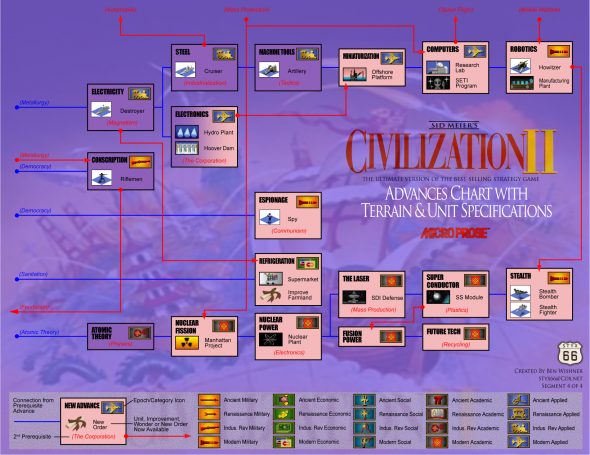
But something weird happens when your civilization catches up with modern civilization. The “develop civilization” stuff starts feeling more nakedly mechanical — rather than feeling like you built the Hubble Telescope, you feel like you got a bonus to spaceship production. (I think this is down to us not having a good enough historical imagination. It’s hard to think seriously about the invention of bronze: bronze has always existed, hasn’t it? So if you tell me that it just lets you build some slightly stronger stabby-guys, I’m like: “sure, that’s probably what it was really like.” But the Hubble — I’m not a Hubble expert, but know enough about the Hubble to know that it doesn’t have that a crudely productive function of that kind. So basically immersion is broken by this.
Perich: Hm – I don’t know if any of the earlier tech tree feels less mechanical to me. I don’t get that excited about discovering Gunpowder or the Printing Press – I get excited about being able to stage musketeers or expand trade relations. So climbing the tech tree doesn’t particularly break immersion for me.
What breaks immersion for me is it taking 20 turns to explore and secure the continent around my founding city with 1 scout and 1 warrior, with each “turn” taking 25 years. So there’s a military unit that’s been ranging abroad for 500 years? What does “home” even mean to them?
I know that, in the reality being simulated, the lone scout 30 hexes away isn’t meant to be a single unit, but rather represents the expanding frontier and a perpetual cycle of soldiers on the front, soldiers coming home, PTSD, etc. But the game doesn’t help that immersion much.
Stokes: Yeah, the different games take place on different temporal scales. Because most of the turn-to-turn decisions are about what you do with the units, I tend to think of that as the “real” scale, the game clock notwithstanding. (Which would mean that, rather than sending a cavalry unit on a 500 year exploratory mission, you have a civilization moving from flintlocks to nukes over the course of a five year war.)
But then there’s the game of world conquest. For some reason, I’m fine with playing this game when I’m playing with bronze-age units, and even up through smooth-bore rifles. But once we’re dealing with tanks and nukes, I stop wanting to do it.
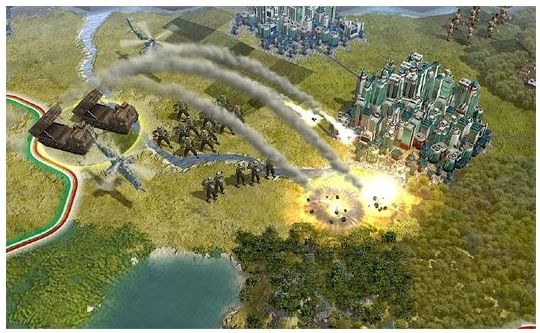
I feel like the goal at that point should be: PREVENT the world-spanning total war. That’s even programmed into the game to a certain extent: nukes destroy the landscape, and building the spaceship feels sort of like winning on hard mode. Still.
For me — and I’ll own that this is an idiosyncratic impulse — the world-domination game and the develop-civilization game both kind of fall apart once you reach the modern era. Winning the first feels monstrous, winning the second feels fake. (I mean, in a way: I get that it’s just a game, but the flavor still matters.) I kind of want Civilization to dream small, at that point. Once you build your civilization up to approximately the present day, I think it should turn into Sim City, where the game doesn’t even have a win state, and the goal is just to flourish and thrive for as long as you can.
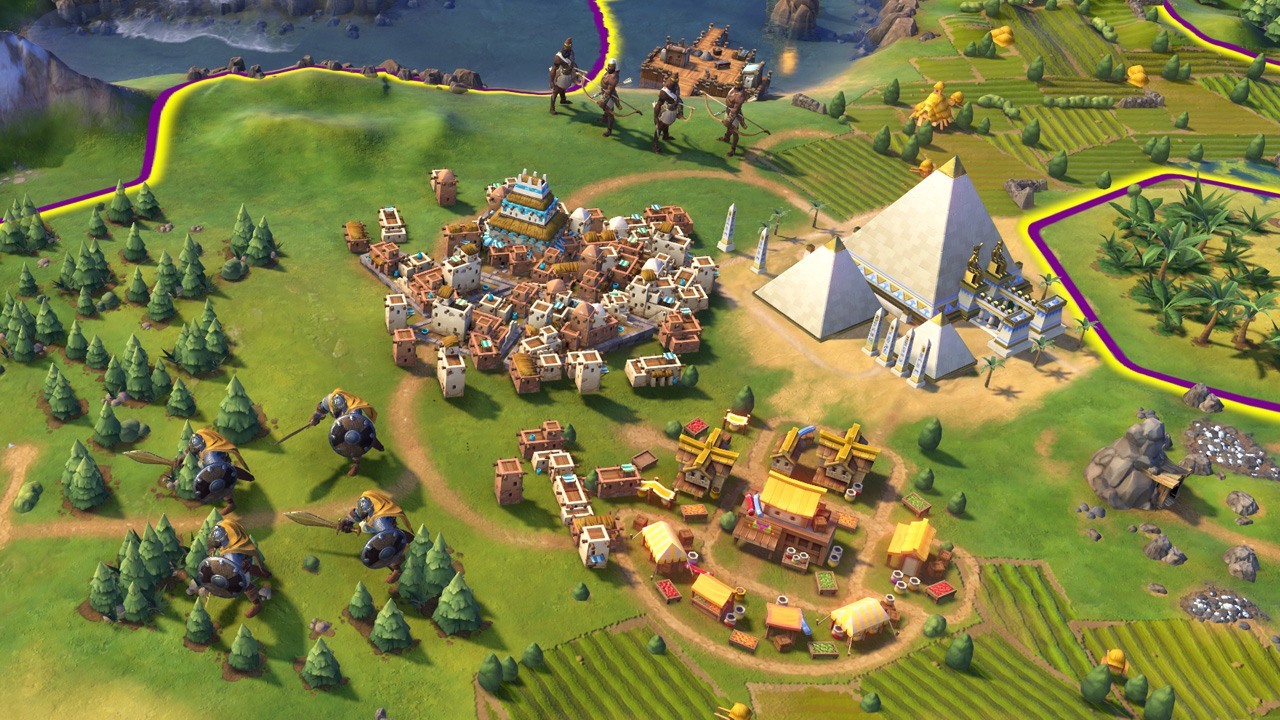
I haven’t played since Civ IV ( on purpose, mostly, since when I played it would consume all my life) but I would always try to win a cultural victory. For some reason, it seemed like the most fun. It was partly because, I hated building wide, no matter how good a strategy. I wanted to build the biggest, shiniest, most impressive cities I could. What I always though a cultural victory to mean was that you had created a culture, a civilization, that would basically underlie, and seep into most of the world for hundreds of years. Take as an example the real Roman culture (the Romans were one of my go to Civs). Today, much of Europe speaks languages derived from Latin, throughout the world their system of writing is employed the laws and systems of governments are derived from what they had. We still use their calendar, and many of their inventions. Their religion (Roman Catholicism, not their pagan practices) is one of the biggest in the world. Sure, much of their culture had greek influences, but the Eastern Roman Empire was based in and near Greece, spoke greek, and still called themselves Rome. So, to me Rome won a cultural victory because 1600 years after its fall, it’s culture is still so pervasive that much of the world is still practicing it.
In a related sense, and as a way to speak to why the early stages are so much more fun than the later ones, a cultural win in Civ is a way to play out alternate history and imagine an alternate player. I was born in South America, where Spanish culture is obviously still ridiculously strong ( though there’s a discussion to be had about how much of it is passed from the Roman one I discussed above). So, one of my favorite games in Civ was to pick an indigenous American civ (usually the Aztecs or Inca, but not always) and repeatedly quit the game until one of my opponents was the Spanish. Then, I would demolish them militarily, but also make sure each of the cities I took over was one of my most culturally accomplished ones. It was a way, a way to imagine a world where Aztec, or Incan, or Mayan culture had done what the Spanish did in real history.
I’ve also always wished for Civ to turn into SimCity, with the extra joy of turning up the microscope all the way to 1000x into Sims 3. ;D A game set up like Google Earth, where zooming in and out can radically affect gameplay!
Not only am I playing the Celts in a game of world domination, but I can zoom in to run Caer Dafydd for a while, and then zoom in more to see what life is like for (the apparently immortal) CoolBeans McAwesomepants and her family. ^_^
One of the happiest days of my relationship was when my BF found a way to get Civ II to run on my Mac. He was never so pleased and proud to be ignored for an entire 24-hr period. ;D AND I LOVE THE RANDOM HUT ‘CHEAT’. SO MANY FREE CITIES, GUYS. (you save the game just before ‘discovering’ it, so if you don’t get what you want, you can reload the saved game and try again. eeee!)